Advocate Bill Format
Create & Manage Professional Advocate Invoices in Seconds. Save time on paperwork & focus on what matters most – your clients.
- ⚡️ Create professional invoices with Vyapar in 30 seconds
- ⚡ Share Invoices automatically on WhatsApp and SMS
- ⚡️ Connect with your parties through reminders, greetings, business cards and more
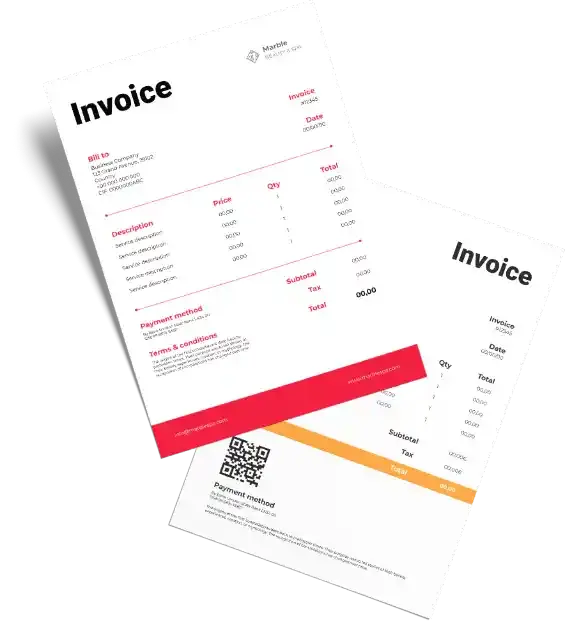
Download Advocate Bill Format in Excel
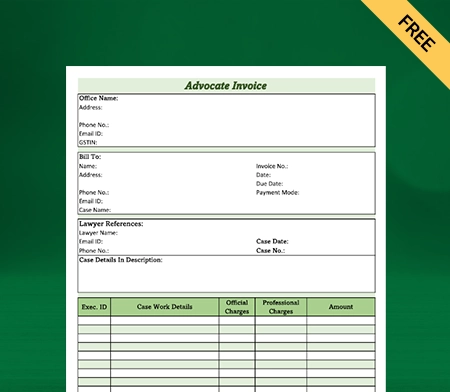
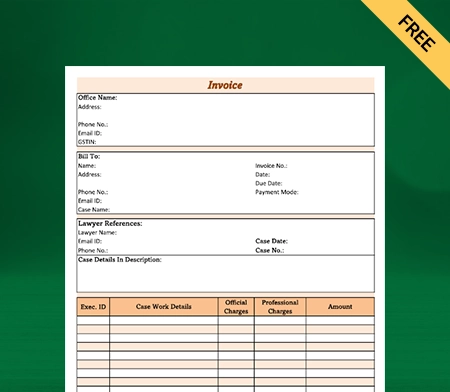
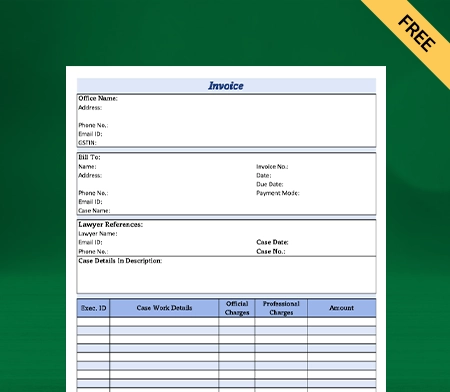
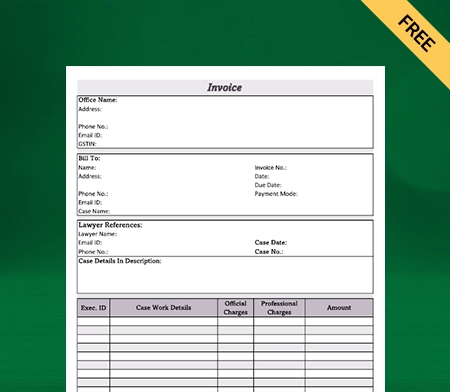
Download Advocate Bill Format in PDF
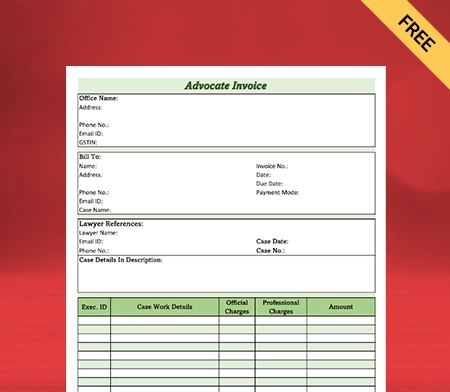
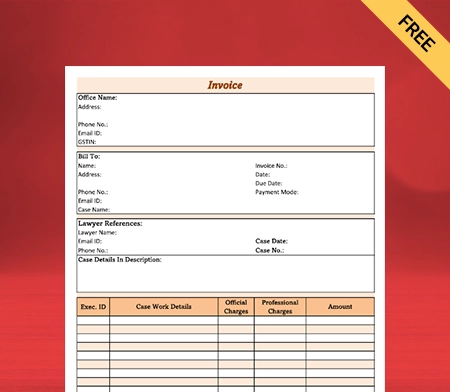
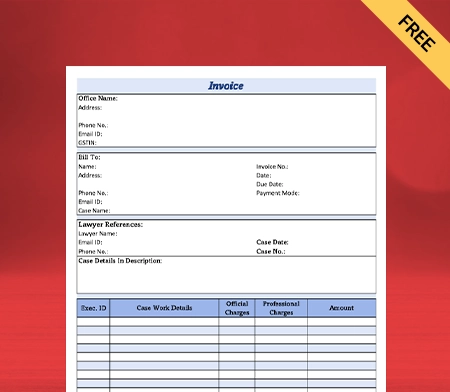
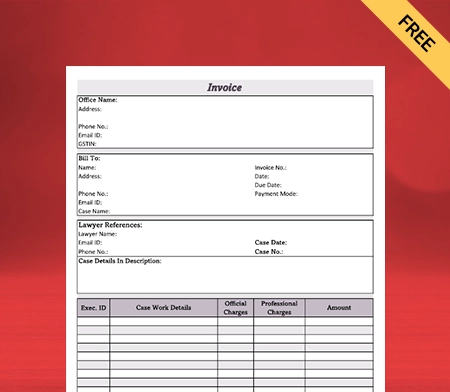
Download Advocate Bill Format in Word
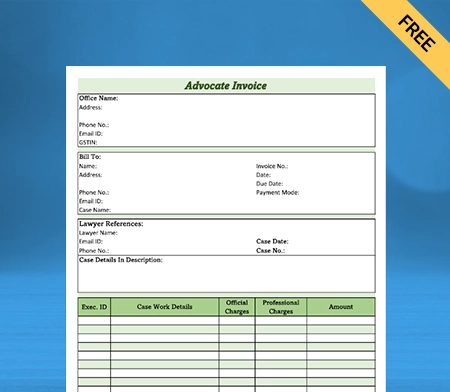
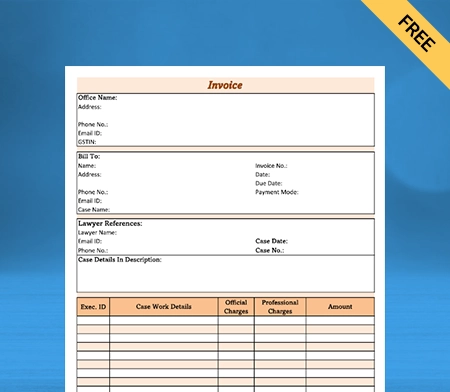
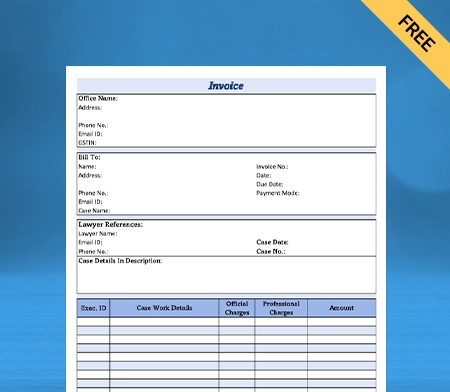
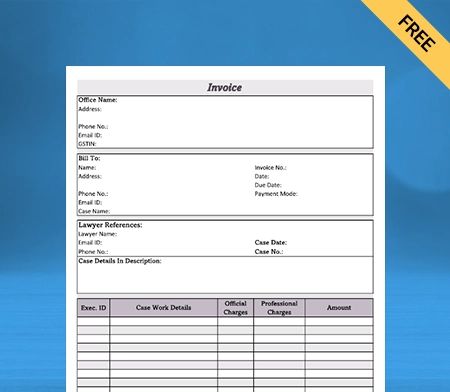
Download Advocate Bill Format in Google Docs
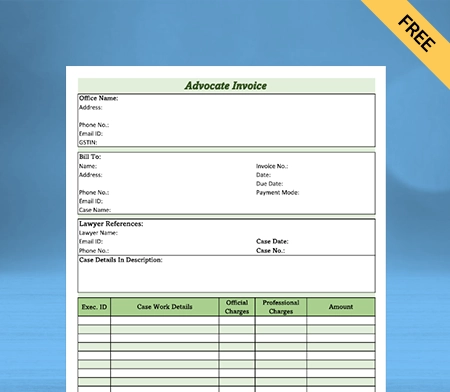
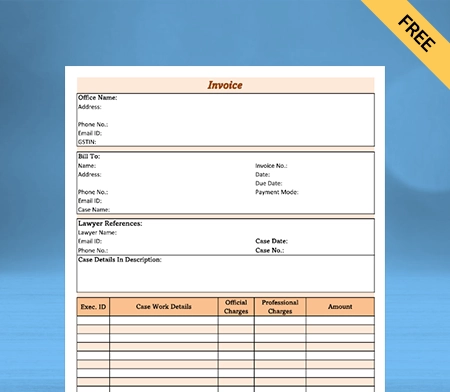
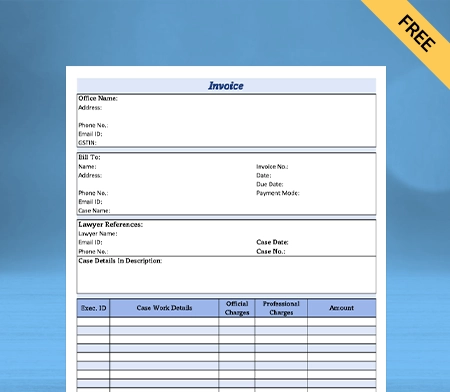
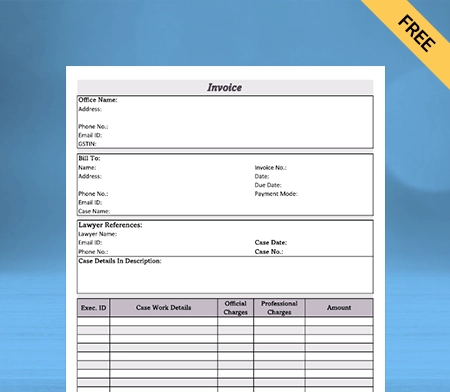
Download Advocate Bill Format in Google Sheets
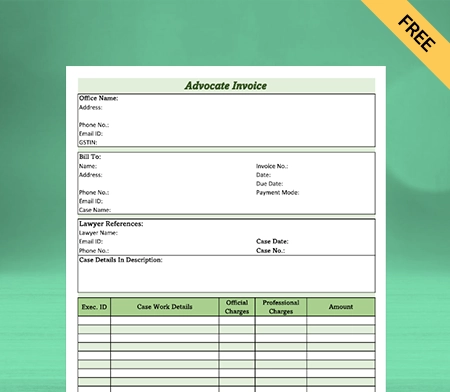
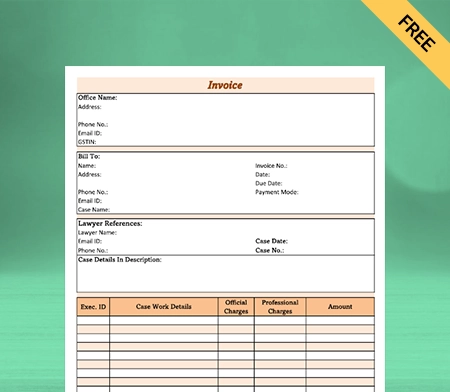
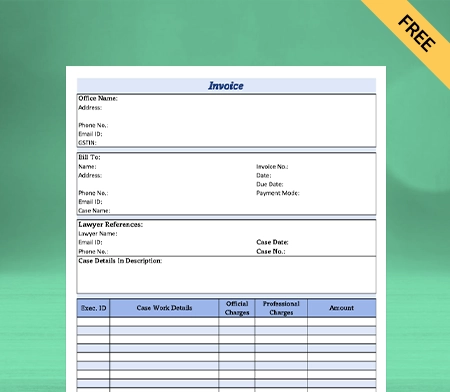
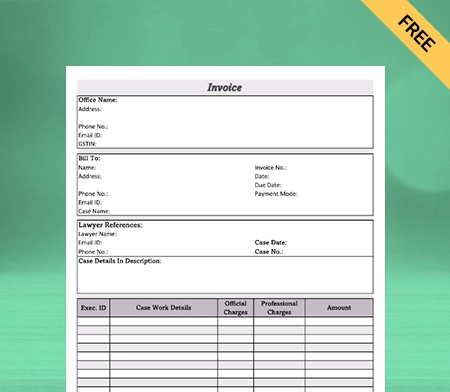
What is An Advocate Bill?
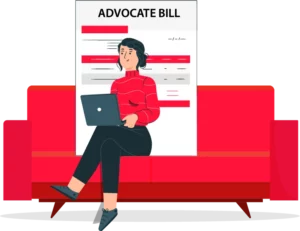
An advocate bill is a document containing information on the expenses incurred by the advocate while working on that case. The advocate prepares it after the court case is finished.
If the advocate’s fee is not mutually agreed upon between the client and the advocate, the following rules should be followed:
– The Advocate’s fee should be reasonable.
– The fee should not be charged based on the result of the case.
– The fee should not be charged on the basis of the property value involved in the case.
– It should be, at most, the standard fee for a similar case.
– The client’s financial position should not be considered.
– The fee should be charged based on the time the advocate spends on the case.
– The fee should be based on the skill and experience of the advocate.
An advocate bill can be created within minutes using a professional advocate bill format. It helps ensure the legal requirements are met. Also, you can customize the template to fit your unique needs.
In India, specific rules regarding the advocate’s fee are given in Section 35 of the Advocates’ Act, 1961. If the price is mutually agreed upon between the client and advocate and there is no issue, then the advocate can charge that amount.
What are the Different Types of Legal Services?
Legal services are an essential part of society. Legal services are necessary to maintain law and order in the community. Different types of legal services are provided by the lawyers to the client.
Here is a list of different types of legal services which lawyers provide.
Insurance:
An Insurance lawyer provides legal services related to insurance. Insurance is a contract between two parties. The two parties are the one who is insured and the one who insures.
In this contract, the insurer agrees to pay the insured the amount which is insured in exchange for the premium. The premium is the amount that the insurer takes from the insured. The risk is the possibility of being exposed to danger. The danger is the possibility of being hurt.
If the insured is exposed to the danger and gets hurt, then the insurer pays the insured amount. It is the basic principle of insurance. The different types of insurance that lawyers provide are life, health, property, and the like.
Criminal:
This type of lawyer provides legal services related to the crime. A crime is an offense that is punishable by the law. A person who commits a crime is called a criminal. The punishment is given to the criminal according to the crime committed.
The lawyer provides legal services related to the crime by filing a case in court against the criminal. He presents his case in court and tries to get justice. The punishment may be imprisonment or any other punishment given by the law.
He can also provide legal services to the defendant by defending him the criminal in court. He must present his client’s case in court. He tries to save his client from punishment by proving that his client is not guilty and not a criminal.
Divorce:
A divorce lawyer is an expert in providing legal services related to divorce. A divorce is a legal process whereby the marriage is dissolved. In some cases, the marriage is broken, where the husband and wife are separated.
Corporate:
A corporation is a legal entity that has a legal personality. This legal entity is separate from the shareholders. The shareholders are the persons who have ownership of the corporation. The shareholders are the owners of the corporation.
The corporation must follow the rules and laws the government and the courts set. A corporate lawyer provides legal services to the corporation. He helps the corporation follow the rules and laws and to solve problems.
The lawyer also provides legal services to the shareholders. He helps the shareholders to get their rights and to solve their problems.
Contract:
This type of lawyer provides legal services related to the contract. A contract is a legal agreement between two or more parties. It is seen as a legal instrument between the parties to do or not do the things written in the contract.
It binds the parties to perform the legal obligations to follow the terms and conditions mentioned in the contract.
This lawyer helps the parties draft the contract and understand the legal obligations written in the contract, which also include the terms and conditions of the contract.
Property:
A property lawyer provides legal services related to the property. The property is the ownership of the person. Property is the thing a person has the right to sell, lease, and the like. The owner can also dispose of it at will.
The lawyer helps the person to transfer the property, which includes the sale, buying, lease, gifting, and transfer through a will. He helps the person solve the problems related to the transfer of the property.
Civil:
This type of lawyer provides legal services related to civil matters. The civil matter is the matter which is related to private rights. A civil matter is a non-criminal matter.
What are the Prerequisites of An Advocate Bill Format?
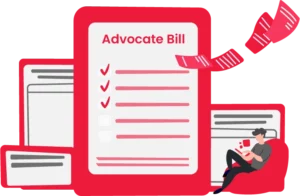
There are two Important points to note during the formation of an advocate bill format, and these are as follows:-
1: Details to be Added by the Payee
The bill of fees should contain the following details:
- The name of the client.
- The name of the case.
- Details of the court in which the case was filed.
- A brief description of the case.
- The work done by the advocate.
- The time spent on the case by the advocate.
- The total amount spent on the case by the advocate.
- The total amount of fee charged by the advocate.
- The amount of fee received from the client.
- The balance amount is to be paid by the client.
2: The Process is to be Followed
- The advocate should sign the bill of fees.
- It should be sent to the client through a Registered Post.
- The client can object to the invoice provided by the advocate.
- The client can request the court to reduce the fee amount the advocate charges.
- The client can also apply to the court within 30 days of receiving the bill of fees.
- In the application, the client can state the reasons why the amount of payment is excessive.
- The court can pass an order reducing the amount charged.
- It is done on the basis of the reasons stated by the client.
- The advocate can also move an application to the Bar Council to receive the fee.
- The Bar Council has the power to direct the client to pay the fee to the advocate.
- The Bar Council will take into account the reasons stated by the client.
- It will also consider other factors, such as the time spent, the work done, and the fee for a similar case.
- If the client does not pay the fee to the advocate, the advocate can file a case in court to recover the fees.
- The interest charged should be reasonable.
What is An Advocate Billing Office?
An advocate billing office is a place where the advocates calculate their fees. Here the lawyers work together. It is a place where the lawyers submit their bills. After that, the invoices are sent to the client.
The advocate billing office is usually inside a lawyer’s office. Many lawyers have their own advocate billing offices and they use office invoice software to generate bills. The advocate billing offices are generally open from 9:30 AM to 6:30 PM. The lawyer’s office is typically open from 10:00 AM to 7:00 PM.
How is Advocate Billing Done in India?
The fees for advocates are usually divided into two parts:
1) Advances and
2) Final Fees.
- Advances:
Advances are always charged at the start of the case. The amount may be changed based on the following factors:-
1) The type of case.
2) The complexity of the case.
3) The length of the case.
Some advocates also charge an advance for filing a case, which generally ranges from 10% to 20% of the final amount.
- Final Fees:
The final fees are generally charged after the case is over or is in its final stages. The percentage of final fees varies from advocate to advocate. There are some advocates who charge a very hefty amount for the final fee.
Some advocates charge the final fees in the form of a percentage of the case’s value. This amount can be from 20% to 35% of the total value of the case. Some advocates charge a fixed amount for the final fees. The amount may vary from 2.5 lakhs to 25 lakhs or even more.
Problems With Traditionally Made Advocate Bills

The problem with advocate bills created using the traditional invoice formats is that the client does not know to get the entire details for a transaction transparently. It can be hard to tell the amount differences between the estimate and the final bill, which can result in disputes.
There are some cases where the client has to pay more than the case’s value due to changes during the contract. It is because the case has to be fought for many years, potentially increasing the timeline and scope of work.
This billing format can be a bit risky for the client. Some advocates also charge a very hefty amount as the final fees. The amount can be more than the value of the case. It can be very problematic for the client, and he/she may not be able to afford it.
If the client gets confused due to invoicing issues, they may think that the case is not worth fighting for, and they may not want to continue your services, which can be a setback as a lawyer.
Importance of An Advocate Bill Format
To a person who has never been in a court of law, the concept of legal billing may not be easy to understand. It is essential for a client to understand what legal billing entails and how it is done.
The legal billing process is vital in understanding the legal fees and charges. The purpose of legal billing is to communicate the value of the legal services the lawyer provides to the client.
Legal billing is not a simple process; it is a complicated process that is not only time-consuming but also hard to understand by a layman. The client and lawyer often find legal billing to be an issue. It can be solved by using advocate bill formats.
The client may find it hard to understand legal billing and its procedure. Legal ethics binds the lawyer to bill fairly and accurately. Using an advocate bill format, you can mention all terms and conditions in the bill, making the entire process clear for your clients.
The law allows the lawyer to bill the client for the services that have been performed and not for the services that are to be performed. So, you can create an estimate to provide an idea but bill them using advocate bill formats that follow the guidelines.
There are some standard billing methods that lawyers use while billing their clients:-
1. Hourly Billing Method:
One of the most commonly used methods is the hourly billing method. Under this method, the lawyer bills the client by the hour. It is the most frequently used method by lawyers.
2. Flat Fee Billing Method:
Another billing method is the flat fee billing method; under this method, the lawyer bills the client a fixed rate for the job that he or she has done for the client. This method is the most commonly used method by lawyers.
3. Contingency Fee Billing Method:
The other billing method is the contingency fee billing method. It is the least commonly used method by lawyers; under this method, the lawyer bills the client for the services the advocate has performed for the client.
What is An Advocate Billing Template?
An advocate billing template is a document that acts as a billing statement for the advocate. An advocate bill format is used for billing against the services provided by an advocate. Using the professional template makes billing seamless for lawyers.
The advocate bill format has information such as the client details, the case details, the amount to be paid, the date of the payment, the mode of payment, etc. This template is mainly prepared by the advocate and given to the client so that the client can make a payment before the due date.
Major Benefits of Using An Advocate Bill
Some major benefits of an Advocate Bill are:-
1. Clear Information on Services Offered:
You will get unbundled legal services. The advocate will only draft the document for you, and you can get the same attested from an attesting officer.
Keeping records of advocate bills helps to maintain the record of the payment made to the advocates/law firms. Further, you can use the data to check the total fees charged by different advocates/law firms anytime later.
2. Reduces Requirement of Multiple Bills:
The advocate will not charge you for the consultation separately when you proceed with the case. It is a good method to maintain transparency while paying for legal services.
It also helps to maintain a record of the services hired. This method also makes it easy to understand the services to the client. It makes the client aware of the services which he has hired.
As the data clearly mention what services are offered. You pay for the services availed and avoid getting charged for the same thing multiple times.
3. Seamless Calculation of Taxes and Charges:
The taxes that need to be paid can be easily calculated using data collected in the when you use advocate bill formats. Further, this bill helps to analyze the precious data and create reports.
It helps to analyze and record the fees charged by different advocates/law firms. You can use it to maintain a record of the bills received from the advocates/law firms. It helps to maintain the bills received from different advocates/law firms in a single place.
This also helps to calculate the total fees charged by different advocates/law firms for single matters or multiple matters. You can check prices for services and types of matters in a simple accounting app.
Advantages of Using the Vyapar Advocate Bill Format For Payment of Legal Services

Vyapar Advocate bill format is a standard bill format for the payment of legal services. Often, the clients are unaware of the services they are being charged for. Vyapar Advocate bill format helps in standardizing the payment of legal services.
It is a simple format that any legal practitioner can use, whether a lawyer, a CA, or a CS. Here are some advantages of using the Vyapar Advocate bill format for Payment of Legal Services:
- It is a simple format that anyone can understand, making it useful for all.
- The bill format is made after considering the requirements of the Hon’ble Supreme Court of India, Bar Council of India, Bar Council of Delhi, Advocates Act, 1961, etc.
- It is a simple format that any legal practitioner can use, whether it is a lawyer or a CA or a CS.
- It is a transparent format as it has all the information regarding the service rendered by the legal practitioner.
- It is a convenient and efficient bill format as it details the services rendered by the legal practitioner.
How to Use the Vyapar Advocate Bill Format For Payment of Legal Services?
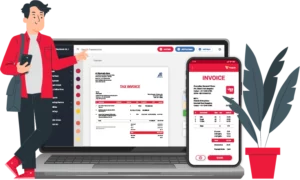
- The Billing Software Vyapar is a free app that can be used to keep a record of payments for legal services. This can be used both online and offline.
- Users will have to install and register in the app. Then the user can create his invoice by choosing the GST/Non-GST option.
- Users will have to enter the service details and the amount. The invoice will be generated using a professional advocate bill format.
- Users can save the invoice on their mobile or share it via Whatsapp, Email or any other medium.
- The invoice also contains the GSTIN number and the HSN code of the services used by the client.
- The client can also calculate the tax amount from the Vyapar app. The app can also be used to keep a record of Income and Expenses by choosing the option from the main page.
Frequently Asked Questions (FAQs’)
The Advocate Bill template will be a single-page Bill to be printed and filled with the particulars of the case in a handwritten manner. The Advocate bill format by Vyapar is your one-stop solution for all your advocate bill template needs.
If you are a lawyer or an Advocate and are preparing an Advocate bill for the first time, then the Advocate bill format is for you. The Advocate bill template will help you prepare a comprehensive bill for your clients that will cover all the areas you have worked for the client.
The Advocate bill template will also help you prepare a bill you can use for your own use. It is a handy template for lawyers with many clients with different needs. The template is also helpful for lawyers who want to prepare a bill for their clients.
1. Open the Vyapar accounting software for attorneys and Download the attorney invoice template free in your preferred file format.
2. You can easily personalize it according to your choice.
3. Add the client details, such as the client’s name and client phone number. Also, mention the case number and unique invoice number.
4. Now mention all the services provided with descriptions, rates, and charges.
5. Finally, highlight the total invoice amount after calculating the applicable sales tax and discounts.
While making a legal invoice, include the following points:-
a) The client’s name and address
b) The date of issue
c) The date of service or the period during which the service was provided;
d) A brief description of the service provided;
e) The amount of time spent on the service;
f) The amount charged (including VAT, if any);
g) The method of payment; and
h) The name, contact details, and VAT registration number of the service provider.
A lawyer can charge for his time, skills, and knowledge, and this is what he does. It also depends upon the case, the court, and the advocate. All these factors help in estimating the cost of an Advocate.





